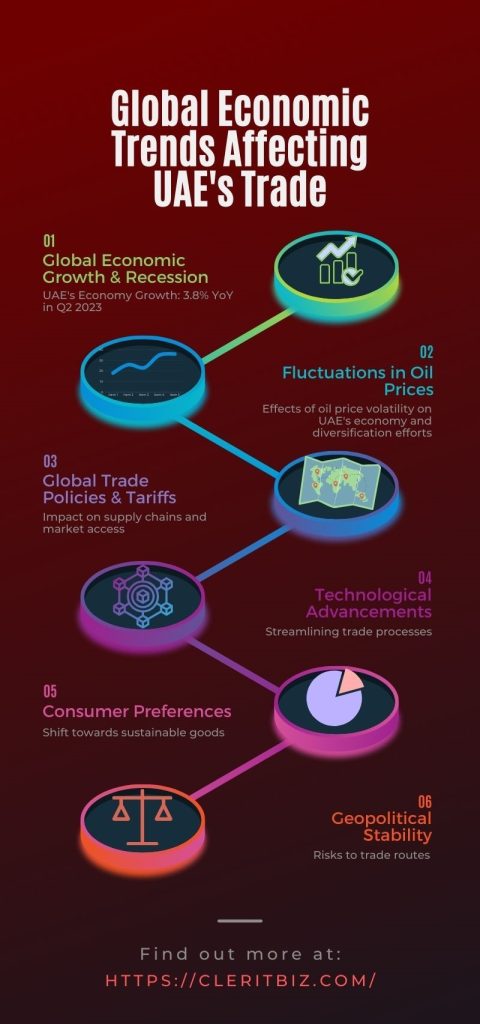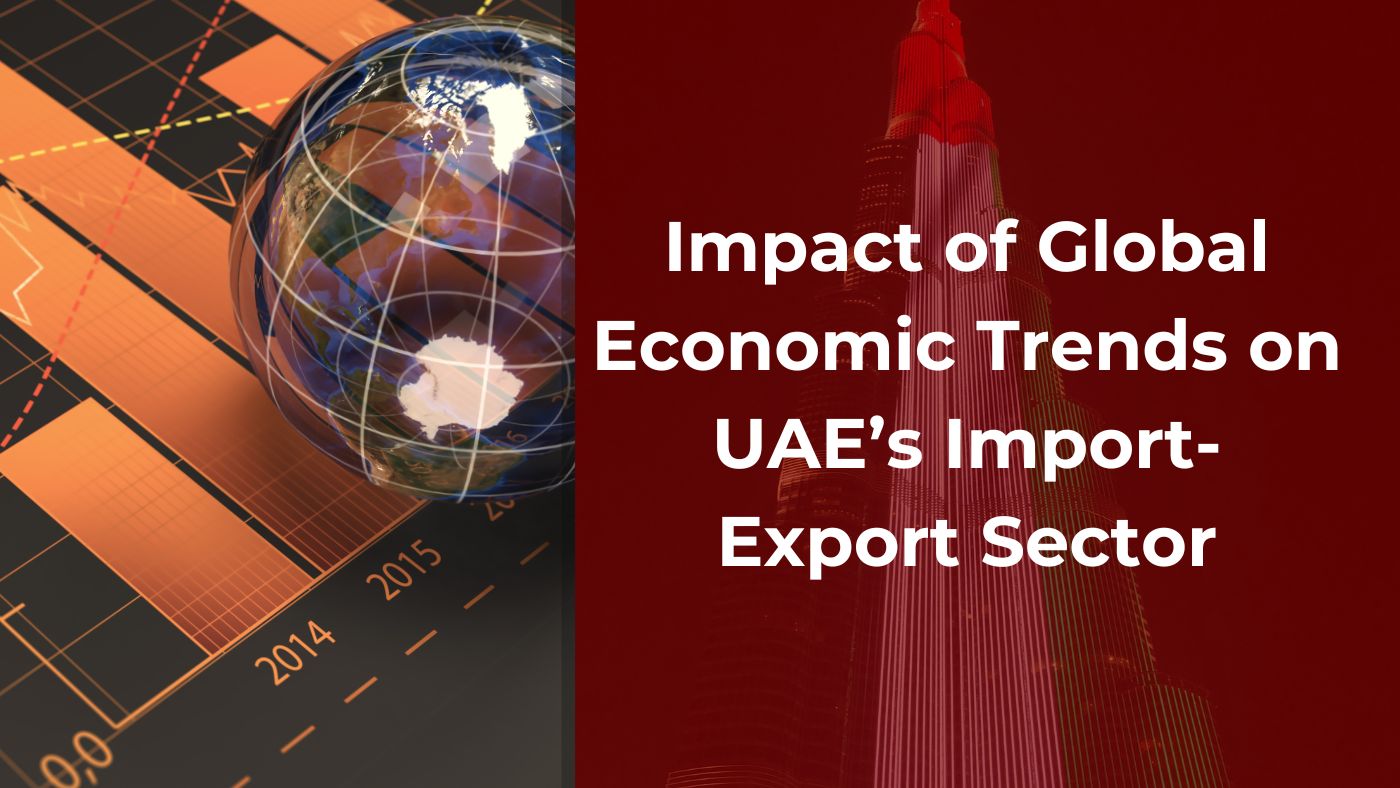The United Arab Emirates (UAE) has stepped up as a significant global trade hub. It gained a maximum advantage from its strategic location, robust infrastructure, and business-friendly environment. The ease of business formation in the UAE has further boosted its appeal to international entrepreneurs and investors.
The import-export business in Dubai plays an important role in the UAE’s economy, contributing a lot to its GDP. However, like any other economy, the UAE too is vulnerable to global economic trends.
In this blog, we will explore how various global economic trends impact the UAE’s import-export sector, with a focus on the import-export business in Dubai and global trends in Dubai import export.
In this blog, we will explore how various global economic trends impact the UAE’s import-export sector, with a focus on the import-export business in Dubai and global trends in Dubai import-export.
Global Economic Trends Affecting UAE’s Trade

1. Global Economic Growth and Recession
The UAE’s economy grew by 3.8% year-on-year in Q2 2023, with a notable increase in non-oil GDP growth to 7.3%.
Because the UAE relies heavily on trade and has a small domestic market, it is understandable that the overall well-being of international economies will have a considerable impact on the UAE’s trade patterns.
In periods of robust international economic expansion, there will be a greater appetite for items and services thereby augmenting the export capacity of the Emirates.
By contrast, demand normally decreases when there is a global depression thus negatively impacting exports.
COVID-19 occasioned a worldwide economic downturn, causing steep declines in trade volumes globally and hurting the export sector of UAE.
2. Fluctuations in Oil Prices
Considering that the UAE is one of the leading exporters of oil in the world, oil prices considerably affect its economy. When the price of oil is high, the UAE earns more hence it can invest in its infrastructure and diversify its economy.
But when they fall due to oversupply or political reasons as has happened in recent years, there is a decrease in revenues from oil sales for the UAE.
Therefore, this variation leads to trade policy adjustments and more concentration on non-petroleum exports so that stability may be maintained, following global trends in Dubai’s import-export.
3. Global Trade Policies and Tariffs
One of the factors that greatly affect the UAE’s import-export sector is the changes in the global trade policies which include tariffs and trade agreements. Trade disputes between countries like the United States and China can lead to disruption of global supply chains thereby influencing goods’ movement.
The UAE which is known for being a major re-export hub should carefully consider these changes if it wants to maintain its trading relations and market access at large.
Coupled with this is the fact that strong trading relationship sustenance is very vital when it comes to Dubai’s export business global trends.
4. Technological Advancements
In all aspects of life around the world, technological development has improved supply chain performance and efficiency, thus reducing prices and leading to new markets. The UAE hence embraced new technology like blockchains, artificial intelligence as well as Internet of Things to enhance its streamlined import-export process.
Such improvements build up the United Arab Emirates’ competitive edge through improved clarity, shortened wait periods, and safe movement of commodities across borders.
5. Shifts in Consumer Preferences
Global customer tastes are changing with an increased craving for products that can endure time and satisfy moral considerations. The UAE’s trade sector responds to such changes through the promotion of goods that are sustainable and produced under ethical conditions.
Matching up to global trends to draw in clients and keep them is not easy for businesses in the United Arab Emirates, but by doing so, they will be meeting the requirements of an ever-changing world.
6. Geopolitical Stability
Global trade is heavily impacted by geopolitical stability. The UAE being strategically located serves as a gateway for trade between East and West.
However, regional conflicts and political instability may interrupt trade routes as well as supply chains. To guarantee the smooth flow of goods across its borders the government of the U.A.E has been taking measures to prevent such interruptions.
Adapting to Global Economic Trends
As an economic center for the world, the UAE has shown its comprehension of changing world market trends by adjusting its import-export policies.
Several measures are being taken by the UAE to shield its import-export sector from outside economic forces:
Diversification of the Economy
This nation of the United Arab Emirates is still making an effort to lessen the amount of revenue obtained from crude oil.
Investments have been made into areas such as tourism, construction (real estate), finance, and development of new energy sources so that trade can expand beyond just petroleum products which are subjected to price changes due to geopolitical events.
Strengthening Trade Relations
The UAE is building up its trading partnership with the rising economies of Asia, Africa, and Latin America.
The untapped potential of these markets and hence their diversity provides an opportunity to further enhance UAE’s trading capabilities outside Europe and North America.
This initiative complies with prevailing import and export business trends in Dubai, where obtaining larger portions of the market is necessary.
Enhancing Logistics and Infrastructure
The United Arab Emirates, with its investments in first-rate infrastructures like ports, airports, and free trade zones, is now recognized as a global trading center.
The establishment of projects like Dubai’s World Logistics Passport enables end-to-end trade transactions making the UAE closer to its principal trading partners.
Promoting Innovation and Technology
With the adoption of new technologies and inventive ideas, the efficiency and establish import-export sector competitiveness in the UAE are on the rise.
For instance, one of Dubai’s Blockchain Strategy is to make UAE appoint as an epitome in technological utilization by making sure that trade activities are safe and other transactional processes transparent.
Global economic patterns significantly influence the import-export sector, particularly in Dubai, United Arab Emirates.
By comprehending and adjusting to these trends, such as worldwide trends in Dubai import-export and global trends of Dubai export business, the UAE persistently strengthens itself as a significant player in global commerce.
The country’s diverse approach towards diversification, technological adoption, as well as strategic trade partnerships, face all odds to remain strong and competitive amidst fluctuating worldwide economic climates.
As the world economy continues to change, the UAE’s ability to navigate these trends, especially regarding import and export business trends in Dubai will be critical to sustaining its growth.

